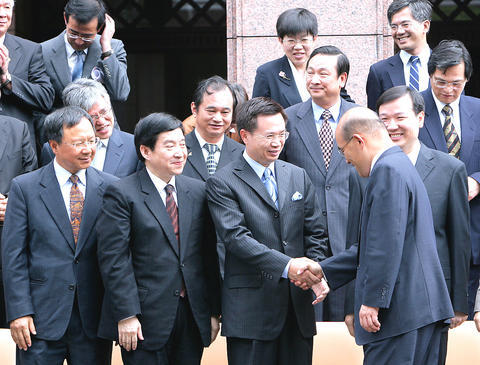Premier Su Tseng-chang (
Su and his Cabinet members took a group photo after presiding over the weekly Executive Yuan meeting earlier yesterday to commemorate the last day of his nearly 16-month tenure.
Su said that although he had met with numerous political challenges during the past 16 months, the help he received from the Cabinet enabled him to deal with the problems.

PHOTO: CNA
"I would not say we did a perfect job, but we definitely did something remarkable," he said.
"The unemployment rate dropped to 3.9 percent. The TAIEX reached 8,000 points," he said. "I think we managed to do something meaningful."
Su also talked about his "Big Warmth" plan. The plan is set to be implemented over a three-year period, and forms the first stage of the government's Economic Development Vision 2015 strategy. The total cost of the project is estimated at NT$1.17 trillion (US$35 million).
"Some of you might be leaving, while some of you may stay. But no matter what, I do hope that our policies can be continued, especially projects like the `Big Warmth' plan," Su said.
The stalled annual government budget proposal had also been a headache for Su.
"It has been my biggest frustration so far. I am leaving office, but I am not abandoning my people. I hope the budget issue can be resolved as soon as possible, so that the government can continue to work for the people," he said.
The Presidential Office yesterday confirmed that Chang had paid a visit to Presidential Office Secretary-General Chiou I-jen (邱義仁) in the morning, but declined to say whether they had discussed the new Cabinet line-up.
Yesterday morning Chang was tight-lipped about the Cabinet reshuffle, saying he would announce the new line-up when things are more settled. Late last night, however, Chang's office issued a statement stating that he had appointed Chiou as vice premier.
The statement said that Chen Chin-Jun (
Minister of Finance Ho Chih-chin (
Keeping the economic and financial team intact reflects the government's decision to maintain policy continuity and market stability, analysts said.
Chen Jin-jun was a three-term DPP legislator before he assumed the post of vice minister of transportation and communications last month.
Lu is a DPP legislator-at-large working on behalf of the underprivileged on the basis of his extended experience with labor unions.
Lu said that he would maintain the government's policy of increasing the minimum monthly wage.
"Premier Su Tseng-chang had said that the minimum wage proposal would be implemented in July. It won't be necessary to change the policy," he said.
He said the proposal had been agreed upon by labor representatives, employers and the government, and that the government should therefore live up to it.
The Central News Agency reported earlier yesterday that the country's representative to Germany, Shieh Jhy-wey (謝志偉) would take the helm of the Government Information Office.
Additional reporting by Shih Hsiu-chuan and CNA

INVESTIGATION: The case is the latest instance of a DPP figure being implicated in an espionage network accused of allegedly leaking information to Chinese intelligence Democratic Progressive Party (DPP) member Ho Jen-chieh (何仁傑) was detained and held incommunicado yesterday on suspicion of spying for China during his tenure as assistant to then-minister of foreign affairs Joseph Wu (吳釗燮). The Taipei District Prosecutors’ Office said Ho was implicated during its investigation into alleged spying activities by former Presidential Office consultant Wu Shang-yu (吳尚雨). Prosecutors said there is reason to believe Ho breached the National Security Act (國家安全法) by leaking classified Ministry of Foreign Affairs information to Chinese intelligence. Following interrogation, prosecutors petitioned the Taipei District Court to detain Ho, citing concerns over potential collusion or tampering of evidence. The

NEGOTIATIONS: Taiwan has good relations with Washington and the outlook for the negotiations looks promising, Minister of Economic Affairs J.W. Kuo said Taiwan’s GDP growth this year is expected to decrease by 0.43 to 1.61 percentage points due to the effects of US tariffs, National Development Council (NDC) Minister Paul Liu (劉鏡清) said at a meeting of the legislature’s Economics Committee in Taipei yesterday, citing a preliminary estimate by a private research institution. Taiwan’s economy would be significantly affected by the 32 percent “reciprocal” tariffs slapped by the US, which took effect yesterday, Liu said, adding that GDP growth could fall below 3 percent and potentially even dip below 2 percent to 1.53 percent this year. The council has commissioned another institution

NEGOTIATIONS: The US response to the countermeasures and plans Taiwan presented has been positive, including boosting procurement and investment, the president said Taiwan is included in the first group for trade negotiations with the US, President William Lai (賴清德) said yesterday, as he seeks to shield Taiwanese exporters from a 32 percent tariff. In Washington, US Trade Representative Jamieson Greer said in an interview on Fox News on Thursday that he would speak to his Taiwanese and Israeli counterparts yesterday about tariffs after holding a long discussion with the Vietnamese earlier. US President Donald Trump on Wednesday postponed punishing levies on multiple trade partners, including Taiwan, for three months after trillions of US dollars were wiped off global markets. He has maintained a 10 percent

TRADE: The premier pledged safeguards on ‘Made in Taiwan’ labeling, anti-dumping measures and stricter export controls to strengthen its position in trade talks Products labeled “made in Taiwan” must be genuinely made in Taiwan, Premier Cho Jung-tai (卓榮泰) said yesterday, vowing to enforce strict safeguards against “origin laundering” and initiate anti-dumping investigations to prevent China dumping its products in Taiwan. Cho made the remarks in a discussion session with representatives from industries in Kaohsiung. In response to the US government’s recent announcement of “reciprocal” tariffs on its trading partners, President William Lai (賴清德) and Cho last week began a series of consultations with industry leaders nationwide to gather feedback and address concerns. Taiwanese and US officials held a videoconference on Friday evening to discuss the